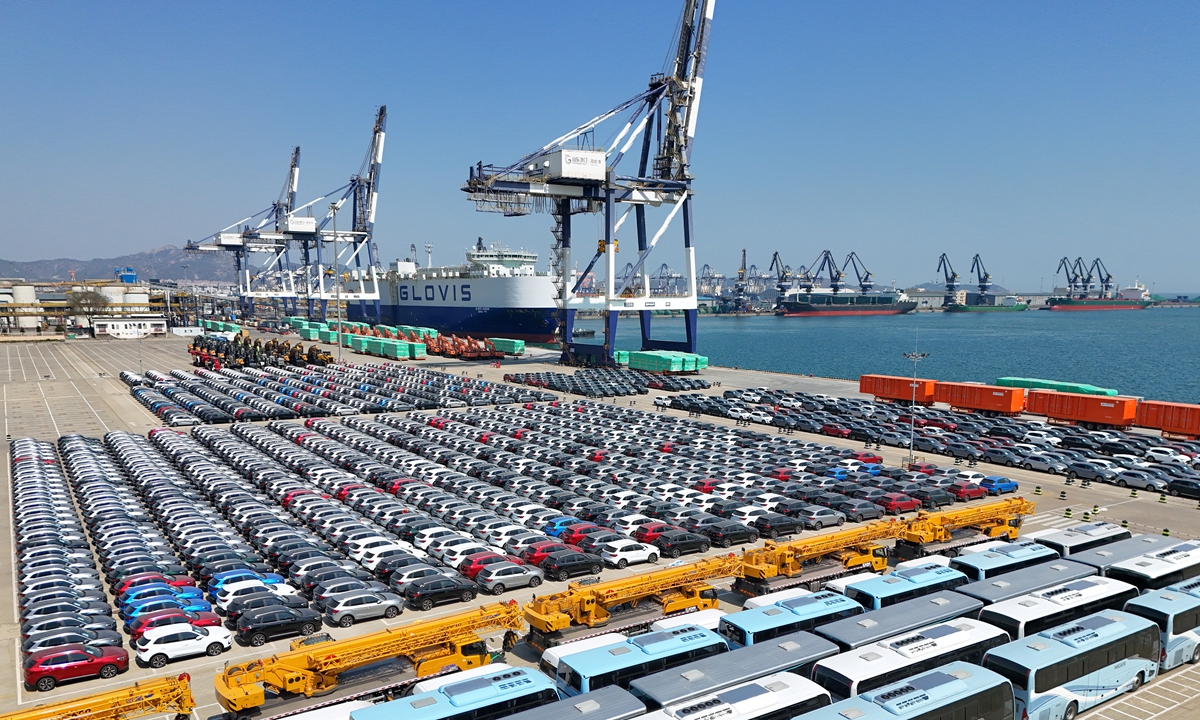
Domestically made vehicles are gathered at Yantai Port in East China's Shandong Province on March 30, 2025, waiting to be loaded onto ships for export. According to the Ministry of Transport, China's total port cargo throughput reached 1.76 billion tons in 2024, with container throughput reaching 330 million 20-foot equivalent units, maintaining its position as the world's No.1. Photo: VCG
The Wall Street Journal reported on Tuesday that Washington plans to isolate China with ongoing tariff negotiations, by pressuring US trading partners to limit their economic engagement with China. However, Chinese experts noted that such a move is unlikely to be effective as countries face the uncertainties of ever-shifting US policies and they are forced to weigh whether the short-term savings will outweigh the long-term benefits of continued cooperation with China.
According to the report, US officials have reportedly asked more than 70 nations to limit China's economic links in exchange for lowered US tariffs. These countries need to prohibit goods transshipped via China, deter Chinese firms from relocating to avoid US tariffs, and reject low-cost Chinese industrial products.
The strategy is said to be spearheaded by Treasury Secretary Scott Bessent, as part of a broader effort to isolate China's economy, Wall Street Journal reported.
As of press time, the US government has not officially confirmed or denied such reports. The Wall Street Journal also said the White House and Treasury didn't respond to their requests for comment.
Rather than isolating China, the reported plan risks alienating the US itself, as other nations grow wary of Washington's unpredictability, Li Yong, a senior research fellow at the China Association of International Trade, told the Global Times on Wednesday.
The plan, if confirmed, serves as US economic coercion, forcing its trading partners to pick sides between China and the US. Given the repeated setbacks of US "reciprocal tariff" approach and mounting domestic disruption caused by its own tariff policies, such a strategy may backfire, Li said.
The reported attempt reflects wishful thinking and is unlikely to be effective, yet its core approach severely disrupts the international trade order and violates fundamental trade principles. Countries will need to weigh the uncertainty of cooperating with an unpredictable US policy stance against the stability of maintaining steady economic ties with China, Li noted.
The White House's tariffs have shifted repeatedly in recent weeks. After introducing a "reciprocal tariff" on global trading partners, the Trump administration paused it for 90 days, retained a 10 percent baseline tariff on nations other than China, and hiked duties on Chinese imports to 125 percent, Reuters reported.
Even if the US manages to persuade other nations to cut trade with China through tariff reductions, the final outcome may not live up to Washington's expectations, Gao Lingyun, a researcher at the Chinese Academy of Social Sciences in Beijing, told the Global Times on Wednesday.
If countries are pressured to secure tariff relief by restricting trade with China, they face a dilemma over whether the short-term savings outweigh the long-term benefits of continued cooperation with Beijing, analysts said.
The US has faced growing backlash from its allies over its tariff policies. The European Union has warned it will impose retaliatory tariffs on a wide range of American products — from soybeans and toilet paper to eye makeup — if ongoing trade negotiations with Washington fail, CNN reported Tuesday.
Although the EU has temporarily paused its countermeasures to allow room for talks, the European Commission cautioned that retaliation will proceed if discussions prove unsatisfactory.
In Canada, US' tariffs have already triggered a response. Ottawa imposed 25 percent duties on non-CUSMA compliant vehicles from the US, and on non-Canadian and non-Mexican content in otherwise compliant cars. Public sentiment is also turning against the US; a YouGov survey cited by The Hill found that 44 percent of Canadians view the US as "unfriendly," and 61 percent said they have begun boycotting American companies.
UN Secretary-General António Guterres previously warned that Trade wars are extremely negative. "Nobody wins in a trade war, everybody tends to lose," when he was asked for reaction to the US' imposition of a minimum ten percent tariff on nearly every country in the world.
During a press conference on Monday, when asked about China's view on US changing tariffs policy, Chinese Foreign Ministry spokesperson Lin Jian stated that facts have shown and will continue to show that there are no winners in a trade war or a tariff war and protectionism will lead nowhere. The tariff tsunami hurts the US itself as well as other countries. We urge the US to quit maximum pressure and resolve issues through dialogue on the basis of equality, respect and mutual benefit.




